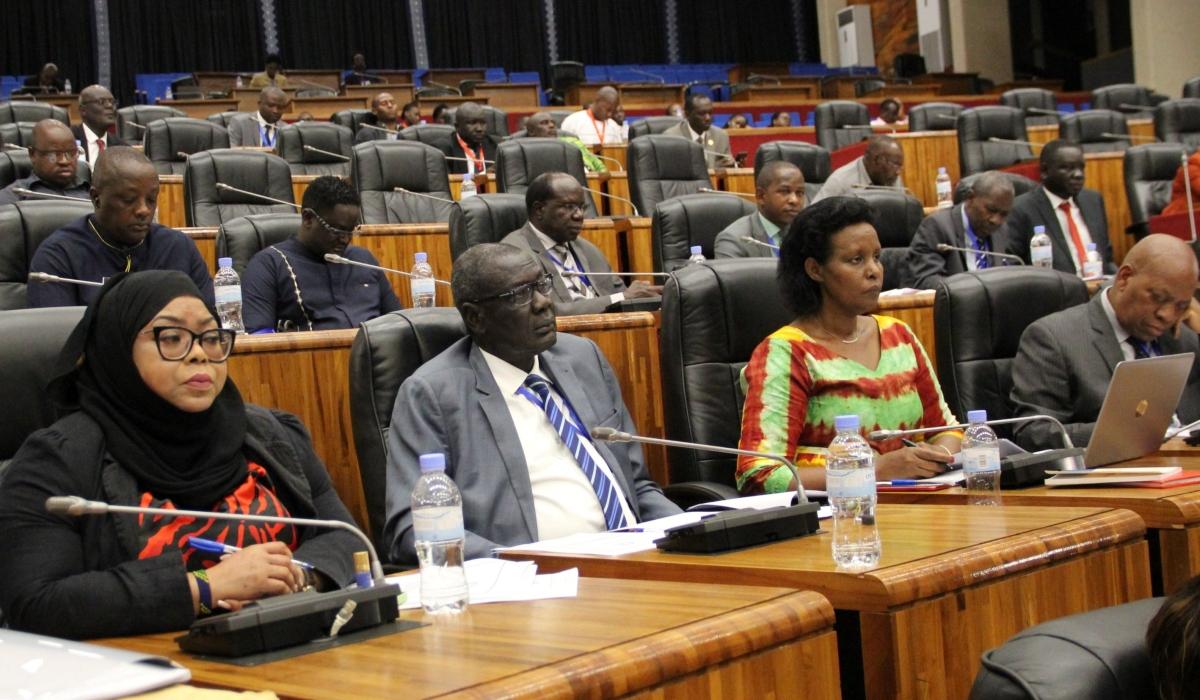Africa-Press – Rwanda. The ongoing East African Crude Oil Pipeline Project (EACOP), which is expected to have a capacity to produce 246,000 barrels of oil per day, has attracted criticism over alleged human rights and environmental threats. But, last week, it got endorsement from the East African Legislative Assembly (EALA).
According to the project developers, EACOP is a pipeline that will transport oil produced from Uganda’s Lake Albert oilfields to the port of Tanga in Tanzania where the oil will then be sold onwards to world markets.
They say the pipeline is buried and once topsoil and vegetation have been reinstated people and animals will be able to cross freely anywhere along its length.
During its plenary in Kigali last week, the Assembly adopted a motion to support EACOP. The Motion was moved by James Kakooza, an EALA MP from Uganda.
Through this Motion, the House expressed its support for the implementation of the EACOP project, which Kakooza said is intended to benefit the Partner States.
It was in response to the “joint motion for a resolution on violations of human rights in Uganda and Tanzania linked to investments in fossil fuels projects” that the European Parliament adopted on September 14, 2022.
While moving the motion during the EALA meeting, Kakooza observed that the European Parliament “resolution was adopted on the basis of unsubstantiated claims and accusations, and without prior engagement with the legitimate representatives of the people of East Africa.”
He indicated that the project is intended for the mutual interest of the Partner States and for the prosperity of the East African region, pointing out that the Republic of Uganda and the Republic of Tanzania EACOP’s capital investment of some $4 billion represents the largest ever inward investment into the two countries.
It is expected that the project will be in operation from 2025, with oil transported from Lake Albert (in Uganda) to the international markets.
“The project will contribute to the uplifting of the livelihoods of the communities in the partner States, reduce the dependence on external funding and oil imports,” Kakooza said.
MP Abdullah Hasnuu Makame (from Tanzania) said that they (European Parliament) are using baseless information about human rights violation issues that do not exist.
“Some of the information they are saying is that the people whose land the pipeline is going to pass through, have not been compensated. But, actually, we can say confidently that our governments committed, and have actually compensated more than 70 per cent of the people as of now. And the remaining are in the process of being compensated, and that project will be implemented once everyone has been cleared,” he said.
MP Mary Mugyenyi (from Uganda) said this project will support the welfare of the people in Partner States.
“To me, this project is about the welfare of our people, is about poverty fighting, is about our own identity as people who are determined to work for themselves and stop begging [for funding],” she said.
MP Leontine Nzeyimana (from Burundi) said “this mega project will not only benefit the two countries where it [the project] will be implemented. This is an East African project … all of us need to join our efforts and support it in any ways”.
Region not among ‘large polluters’
EALA held that, while carbon pollution contributes to climate change and its adverse effects on the environment, “this pollution comes from just a few countries, some of which are members of the European Union, and its partner countries in respect of energy supply including fossil fuels.”
According to Co2 Emissions of all World Countries Report 2022, a Science for Policy report by the Joint Research Centre (JRC), the European Commission’s science and knowledge service, in 2021, China, the United States, the EU27 (European Union which made up with 27 member countries), India, Russia and Japan remained the world’s largest CO2 emitters.
Together, they account for 66.4 per cent of global fossil fuel consumption and 67.8 per cent of global fossil CO2 emissions.
MP George Stephen Odongo said that the about 250,000 barrels of oil that the project is envisaged to produce every single day, is a very small amount compared to productions by major economies.
“America, produces 13 million barrels of fuel every single day, and consumes 20 million – they have a deficit of 20 million barrels of fossil fuel. Norway produces two million barrels of fossil fuel every single day. China consumes 15 million barrels of fuel every single day,” he said.
For More News And Analysis About Rwanda Follow Africa-Press






